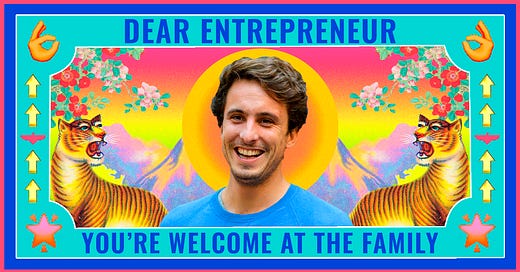Employees vs. founders
One of the frustrating parts of our business is that I am regularly confronted with super business ideas, but given my actual job I don’t have the means to go build them. So over the years I’ve tried to convince people who I think could be great at it to go start these businesses. And I’ve learned something: Inception is very hard.
That’s why I know it’s easier to hire someone with a salary and 5% equity in the business rather than a salary and 95% in the business. One is called an employee, the other a founder.
The job of a founder is very specific
Being a founder is a special role that includes:
No job description: There is no scorecard. You are always asked to do more, reinvent yourself, develop skills far outside of your core, redefine the next step for your business. Product, fundraising, sales, HR: they are all your responsibility.
Long-term commitment: You can't quit. Silicon Valley tolerates failure but hates quitters. Once you’ve committed yourself (especially by raising outside money) you are supposed to do everything possible for the company to succeed, until it works or you get fired.
Extreme ownership: Founders own their successes and failures, they can't blame the company. That's why you hear 'competition killed us', 'investors killed us'. Sometimes it's true, but it's also a way for a founder to cope with failure. It's hard to be fully responsible.
High emotional impact: Founders are often lonely. Few people understand the situation they are in, the problems they encounter; they don’t realize how often founders show up with smiles and energy when the reality of the business is much more difficult.
And yet, intuitively, people feel it: being a founder is too much work - except for founders.
You can't expect everyone to commit like a founder does
Those who commit on the same level as you are your cofounders.
You can count on them to celebrate, you can count on them to cheer you up when things go wrong. They are as emotionally engaged as you. They can keep the ship afloat. They don't stick to "good enough".
Be true in what you’re asking people to do. If they are your cofounders, recognize it and treat them like that. Since cofounders are in this together, you shouldn't own 3X what your cofounders have.
That’s why founders who join later are still cofounders, and should be paid equally well in equity. The next ten years are more important than the last two.
The others in the company are employees.
They can be amazing at their job. They can be extremely experienced and be paid very well in cash and equity (think of Sheryl Sandberg). But they are not cofounders.
If you ask employees to be cofounders, they may burn out. It's something I have witnessed a couple times, with early employees owning 2-5% and being responsible for the success of the business.
Your employees should absolutely be shareholders, it's part of the pay for getting the job done. But their equity should be in $$ amounts, not in percentage points; doing it that way is much more representative of their emotional implication in the business.
All of this comes down to risk, which is something that founders and employees both don’t evaluate correctly. Risk isn’t about what happened in the past or what’s happening now. Risk is all about the future, it’s the 10-year commitment you make as a founder to do everything you can to make the business a success.
Employees’ risk isn’t the same as that taken on by the founders, which is why founders can’t ask employees to behave like founders. And the founders’ risk is exactly why it’s so hard to convince people to take the leap, even for a super business idea that they love.
Still, we see people do it everyday, and they’re some of our favorite people in the world. If you want to join them, apply to our next remote batch at The Family that starts in September.
And if the idea of founding your startup is stuck in your head and you want to meet others who are ready to take the leap too, don’t miss our next Be My Cofounder online event next Thursday.





